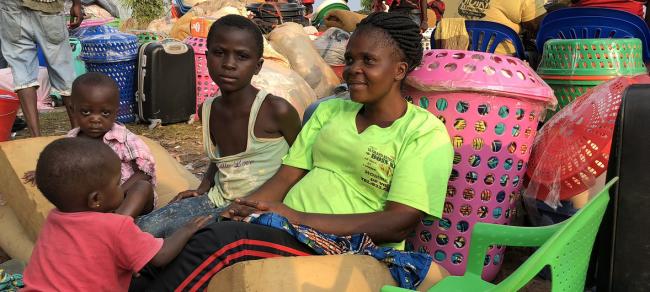
80,000 youngsters at risk in DRC after forcible expulsion from Angola: UNICEF
Tens of thousands of children who have been forcibly returned from Angola to the Democratic Republic of the Congo (DRC) need help urgently, UN Children’s Fund UNICEF said on Tuesday.
The warning concerns at least 80,000 youngsters who are part of a more than 300,000-strong wave of people who have mostly arrived in DRC’s troubled Kasais region since the start of the month.
“UNICEF estimates that among the returnees more than 80,000 are children, and these children are in need of immediate humanitarian assistance,” spokesperson Christophe Boulierac told journalists in Geneva.
The alert follows a warning by the UN’s human rights chief, Michelle Bachelet, that the forcible mass expulsion of Congolese migrants from Angola had resulted in “serious human rights violations by security forces on both sides of the border”.
Some youngsters described having to leave Angola in a rush, after official efforts to reform the country’s diamond mining industry, which reportedly also involved ethnic violence and the destruction of DRC migrant workers’ homes.
Extortion
In addition to suffering from hunger and bad weather, those expelled from Angola have also faced extortion at checkpoints along the country’s border with DRC, UNICEF said in a statement.
The influx of so many people to the Kasais is particularly concerning because the once relatively peaceful region was gripped by deadly conflict between local and government forces in 2016 and 2017 that destroyed vital public services.
“There was a very, very serious crisis of malnutrition in Kasai and these children are coming in a very bad condition from Angola,” Mr Boulierac said, before adding that dangerously low levels of blood sugar - hypoglycaemia – had been diagnosed in some youngsters. “Some of them are suffering from hypoglycaemia and there might be an increase of malnutrition, acute malnutrition, which makes a child more vulnerable to all kinds of disease.”
UNICEF’s immediate concerns about a rise in malnutrition levels have been heightened by the rapid increase in food prices. In Kamako, Kasai province, the cost of corn has doubled since the start of the crisis.
Non-accompanied Children
As the UN agency ramps up its humanitarian aid effort – which includes installing safe drinking water points and emergency shelters in 27 settlement sites - it is also concerned about an as-yet unknown number of particularly vulnerable children travelling alone.
“In Kamako, in the province of Kasai, we have listed 162 non-accompanied children, children who are alone,” Mr Boulierac said. “That’s only in Kamako, and there are many other places.”
Authorities are also wary of a resurgence of epidemics linked to the new arrivals, who are crowded into churches and markets in small border towns, the UNICEF spokesperson said, noting that illnesses including cholera and malaria are already endemic in DRC.
To help the returnee children and their families, UNICEF has appealed for $3 million to fund its immediate response.
An additional $6 million will be needed to support the resettlement of returned populations to their home or host areas, the UN agency said in a statement.
UNHCR/Ibrahima Diane
Support Our Journalism
We cannot do without you.. your contribution supports unbiased journalism
IBNS is not driven by any ism- not wokeism, not racism, not skewed secularism, not hyper right-wing or left liberal ideals, nor by any hardline religious beliefs or hyper nationalism. We want to serve you good old objective news, as they are. We do not judge or preach. We let people decide for themselves. We only try to present factual and well-sourced news.







